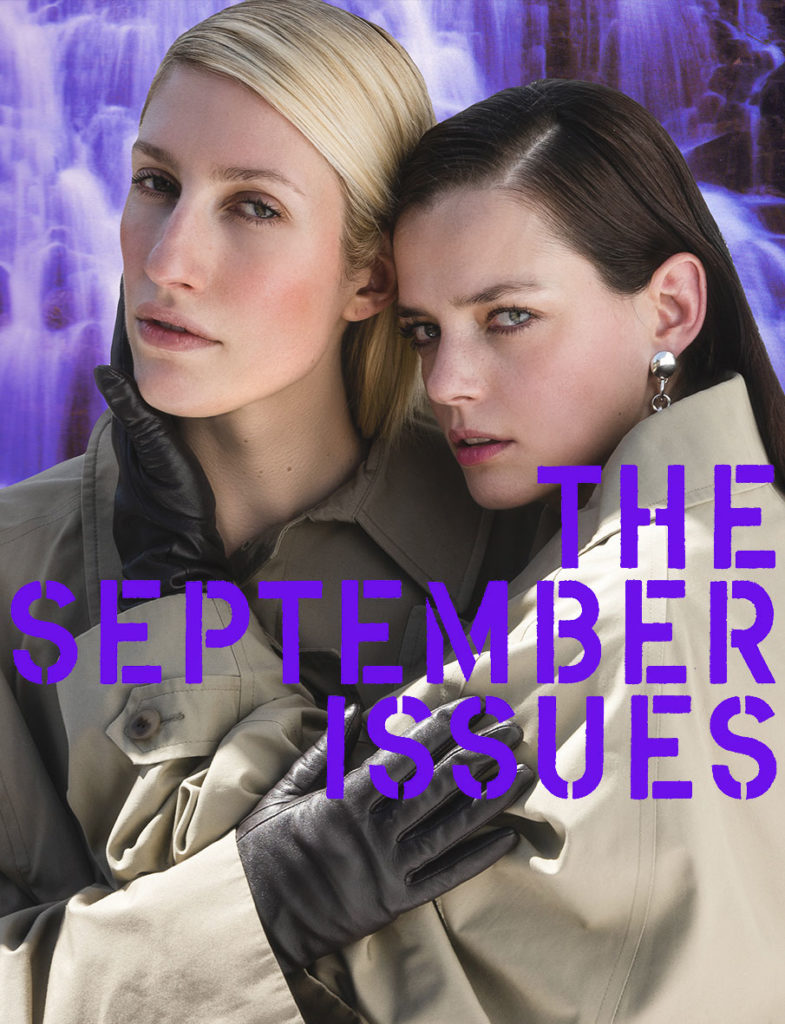
gloves COS
earring ANNIE COSTELLO BROWN
Karley Sciortino and Roxane Mesquida are no strangers to progressive, provocative, and nuanced artistic work. Sciortino is best known for her in-depth, no shame—and no holds barred—writing about sex and love, which started with her “Slutever” blog, led to a Vice show of the same name, and a Vogue column, Breathless. Mesquida is a French actor who has made a twenty year career of working with auteurs, and taking on complex, engaging, multi-dimensional roles. The two women come together as key players in the new show Now Apocalypse, which Sciortino co-wrote with seminal queer writer/director Gregg Araki, and Mesquida takes a starring turn.
The show’s a fevered pop-art depiction of sex, love, and identity amongst the young and sexually fluid milieu of a colorful and bizarre modern-day Los Angeles. The three of us came together on a dazzlingly sunny day to discuss catharsis through art, how female sexuality is portrayed in media, the pitfalls of virtue signaling and the punished slut narrative, and the importance of visibility for social change.
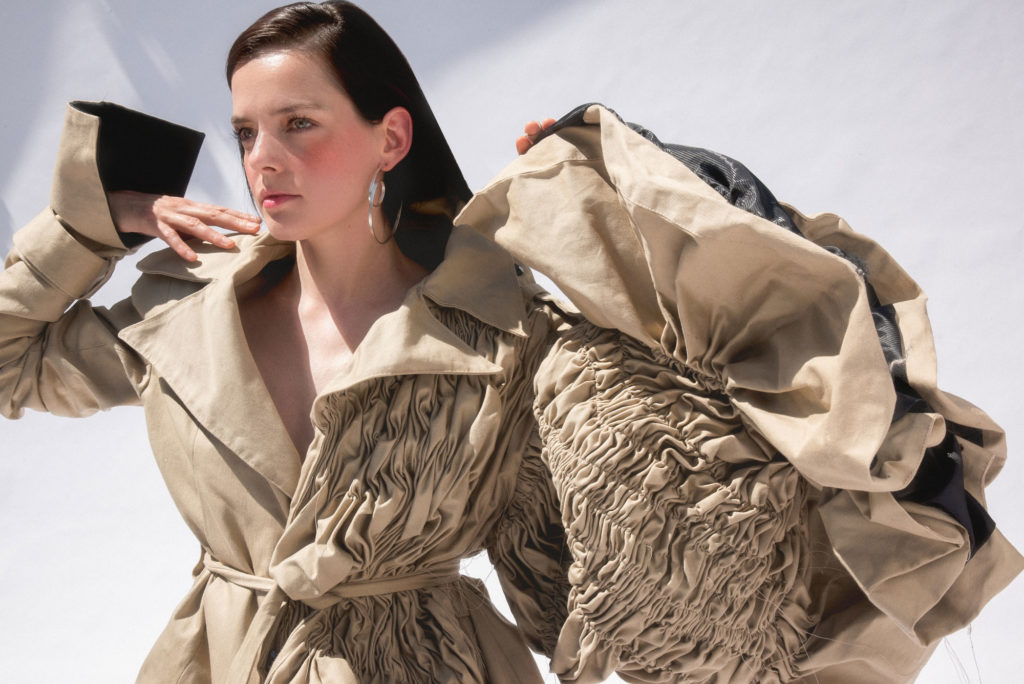
earrings ANNIE COSTELLO BROWN
K: Roxane, you’ve always described yourself to me as a shy person. Isn’t acting a strange job to choose, then?
R: As an actor I feel like I can do things that I’m not letting myself do in real life. That’s why I think I’m always interested in playing characters that are really extreme. You get to express all the emotions that you have inside of you and you use that opportunity to get them out.
K: So it’s cathartic. That’s so cool, I didn’t realize that.
R: Then you don’t repress anything.
K: Right, so basically the characters give you permission to act the ways, and do the things that you can’t in your life.
T: Karley, do you feel like you experience catharsis writing the characters in the same way as Roxane does acting them?
K: That’s a good question. I have been writing for over ten years and I do think that writing is really cathartic, I’ve always felt like that. Writing essays about my life and sexuality is how I became a writer, and specifically writing about getting over the repressive ideas of my strict catholic conservative parents. Being able to write about those experiences and make them funny, and consider them…was always helpful. I always thought of writing as a form of therapy.
“I always thought of writing as a form of therapy. “
-Karley Sciortino
jacket HYUN MI NIELSEN
sunglasses A BETTER FEELING
T: Can you both speak on expressions of female sexuality, and how you think the media and TV in particular can help de-stigmatize sexual experimentation and fluidity? Do you think claiming sexual agency as a woman is different on each side of the camera?
K: One of the reasons I love writing [Now Apocalypse] is that I get to write these amazing powerful, resilient female characters who get a lot of strength from their sexuality, and their sexualities are part of their identity, their personality. Growing up I didn’t see any examples of strong, sexual, promiscuous, confident female characters on TV. There’s all these TV tropes that have been studied, where often when there’s a woman on a TV show or in a film and she sleeps around, she’s somehow punished for that. It’s called the punished slut narrative, and it’s ubiquitous across mainstream media. A really obvious example is in most horror movies is after a girl has sex, she dies. Or the sluttiest girl is always the first to die.
“There’s all these TV tropes that have been studied, where often when there’s a woman on a TV show or in a film and she sleeps around, she’s somehow punished for that. It’s called the punished slut narrative, and it’s ubiquitous across mainstream media.”
-Karley Sciortino
R: But that’s a part of the culture, don’t you think? People are very conservative. In the way they see sexuality, I think.
K: Especially when it comes to overt female sexuality. It’s seen as dangerous or punishable. When I was growing up, Sex and the City was really important, because it was one of the only places where you could see strong female characters that slept around, but also had jobs and families and friends. They were just normal. And, the female characters on [Now Apocalypse] are the most sexually powerful and sexually resilient.
R: Yes. They’re also the smartest.
K: Yes, and also unapologetic. They’re really unapologetic.
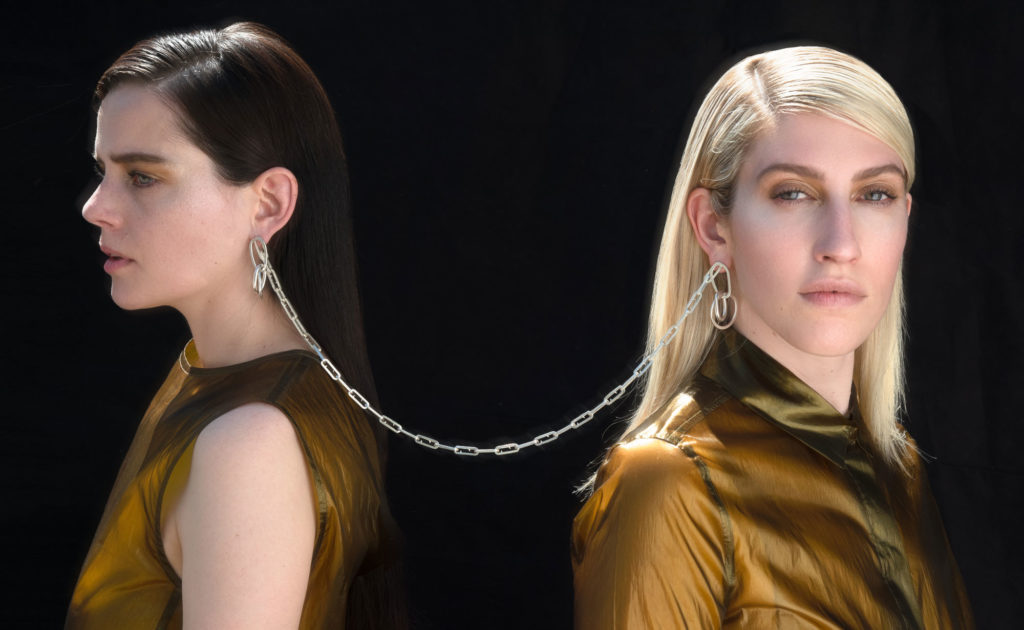
necklace QUEENIE CAO
R: Female sexuality is something that is difficult for me to talk about [in interviews], because to me it’s something that’s established, that’s a part of us. When I started working, I was working with this female director Catherine Breillat, and [sexuality] is also a theme for her. When I was 18 and the movie was in competition, I got all these questions about if I was traumatized, if I was forced to do anything, because I’m losing my virginity for 20 minutes in the movie. I was like…This is art! What are you guys talking about? I feel like people have a hard time differentiating art and real life, especially with actors.
earrings QUEENIE CAO
“I feel like people have a hard time differentiating art and real life, especially with actors.”
-Roxane Mesquida
K: It’s like, by asking if you’re uncomfortable shooting sex scenes, like they also ask you in interviews for Now Apocalypse, they’re assuming that you wouldn’t be able to assert your boundaries or decide for yourself when something didn’t feel good.
R: Right, that we were forced. That we didn’t want to be naked and express these characters. It’s almost insulting to me, because it’s assuming that I’m not smart enough, or that I’m weak and can’t say no if I want to say no.
K: Right, like you don’t have autonomy. It’s taking away your agency. I do think it’s strange that journalists are constantly asking like, ‘oh god! How bad was it?’ Not thinking that it could be fun, or interesting, or worthwhile, or that sex scenes could have value. The sex scenes in Now Apocalypse aren’t just for the sake of having boobs on the show. It’s not about titillation, it’s about character development. When you’re having sex with someone, you see a side of them that you don’t see in real life. The people that you sleep with and know intimately, you know differently than even your closest friends or your family. So we see these characters in these intimate, vulnerable sexual experiences. Sex isn’t just about fucking, it’s about what we’re going through in life and with our partners.
“Sex isn’t just about fucking, it’s about what we’re going through in life and with our partners.”
-Karley Sciortino
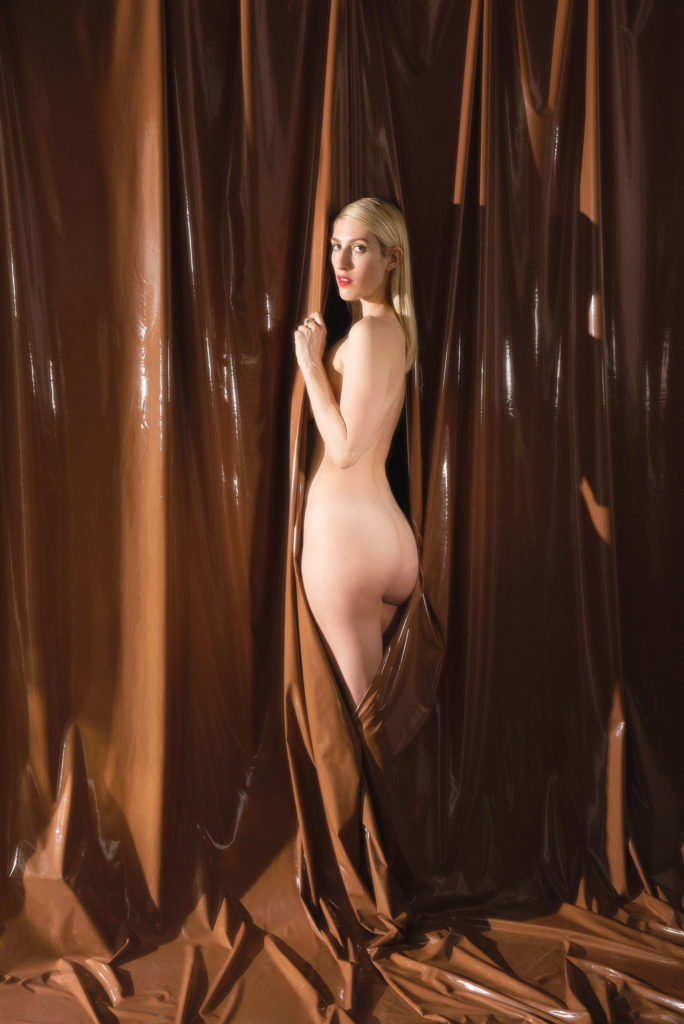
R: Yes, and as people we are always putting ourselves in awkward positions, and it’s okay that it’s sometimes funny, too.
K: I think it’s sad that in America, when young people see sex, they see porn, or they see unrealistic, airbrushed, Hollywood sex. And both of these things are unrealistic. Where can young people see realistic depictions of sex?
T: Roxane, do you find that as an actor, working with scripts where women are writing female characters is different than when men write female characters? How about in regards to sexuality?
R: Sometimes, with women writers, it feels more realistic to the pleasure of the woman, if that makes sense. Sex scenes seem more meaningful in the script and for the characters. But, I’m not really sure there’s a big difference between female and male writers. To me it’s about, are you an auteur, or are you not an auteur? Are you making an artistic movie, or are you making a movie that just needs to be doing well at the box office?
T: Karley, do you see a difference in women writing women, even in the media you consume?
K: I think it’s complicated because I think that film is one of the mediums where men are able to portray sex in an artistic way, or romance in an artistic way, and in a way that people feel like it is interesting and nuanced. Whereas in terms of media commentary, being someone who speaks about sexuality and writes about sexuality, those are almost entirely women.
There’s a history of men controlling the narrative around sexuality, so now people want to hear women talking about sex and relationships. When men do, it’s often through the lens of science. I think it would be a lot harder for a straight guy to write essays about sex and sexuality. Often when we see men talking about sex they’re either bragging, or teaching each other how to be better pick-up artists. The narrative is very narrow. It’s kind of sad, because I think men should be able to speak vulnerably in this space, but no one wants to listen to them. Men are taught they can’t be vulnerable.
“There’s a history of men controlling the narrative around sexuality, so now people want to hear women talking about sex and relationships.”
-Karley Sciortino
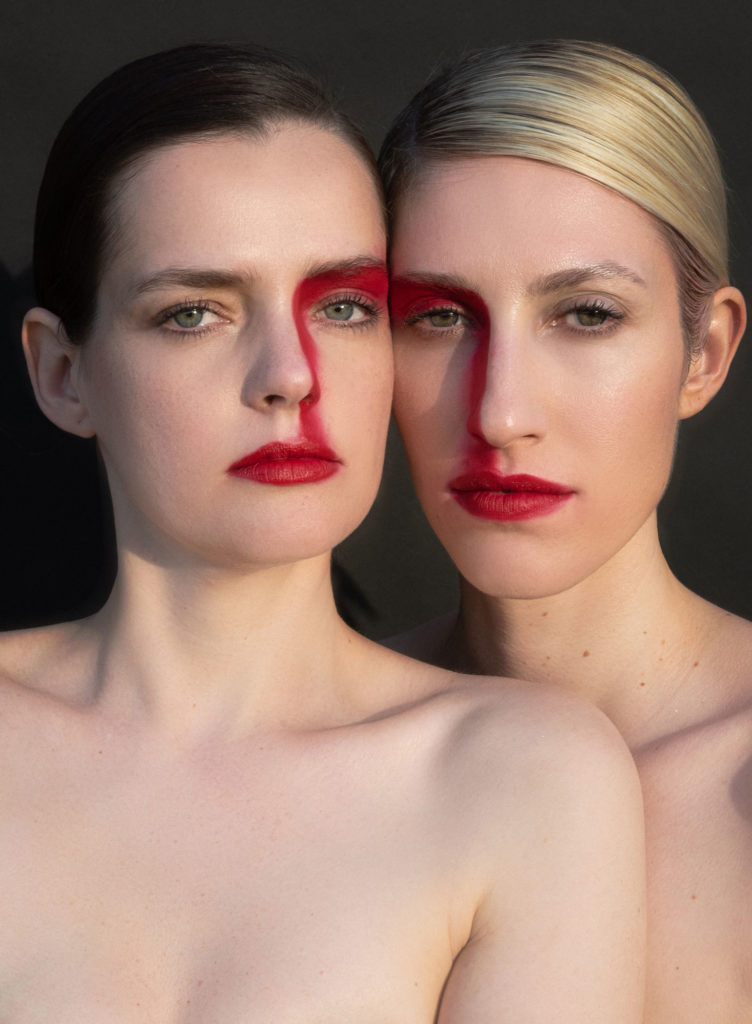
T: Do you two think that society is becoming more attuned to a more expansive spectrum of sexuality and identity? You’ve mentioned that as society becomes more liberal, you have to be more conservative and wary in what you say in a public forum. What’s the relationship between these things?
K: Oh my god I completely agree. Now there’s a currency in being offended, so the more outraged you are by someone’s behavior, the more virtuous you are. It’s sort of where this idea of virtue signaling comes from. Which is when people establish themselves as being better than other people by signaling virtue—by saying, ‘you’re wrong’ and putting yourself morally above other people. It is so annoying because it just feels like everything is a minefield. So then you don’t actually get to have nuanced conversations.
R: I have this feeling since everything is becoming more liberal, we feel like we can be more who we are, but we have to be super careful about what we say. We’re scared to offend someone else. And then it becomes like we can’t say anything, because we’re scared to speak.
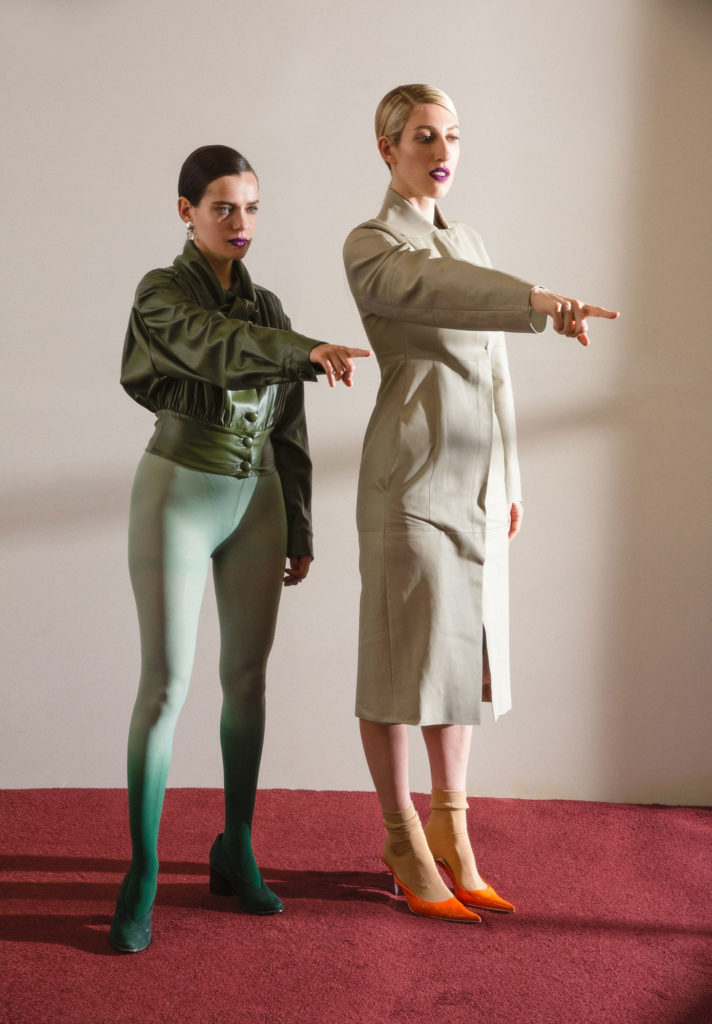
green shoes COS
earrings ANNIE COSTELLO BROWN
tan jacket COS
orange shoes VINTAGE
“I have this feeling since everything is becoming more liberal, we feel like we can be more who we are, but…we have to be super careful about what we say.”
-Roxane Mesquida
R: I feel like it makes things just a little bit boring. It’s very PC. It’s a vanilla artistic period we live in.
K: I know, but it’s a weird time. Because simultaneously we’re making a show about a bunch of sluts and a bisexual guy, and these really sexually powerful women. But also, you can’t make jokes about consent without angering everybody. It’s like, surely we should be able to make jokes about these things that are part of the zeitgeist, and part of our growing cultural conversation around sexual harassment and consent. Since when don’t we make jokes about things going on in the culture? This is how we process cultural shifts and information. There is a lot of positive social change happening, but people are just very self serious. Sex is better when we can laugh at ourselves a little bit.
“Since when don’t we make jokes about things going on in the culture? This is how we process cultural shifts and information. There is a lot of positive social change happening, but people are just very self serious. Sex is better when we can laugh at ourselves a little bit.”
-Karley Sciortino
T: You say it’s a vanilla artistic period, and that virtue signaling feels oppressive, but at the same time here you are making this subversive, progressive show that’s airing on a major network. What do you think is the importance is of showing norm-defying folks and norm-defying behaviors on a major platform?
K: I think it’s so important, I think visibility is extremely important for social change. I think five years ago we would not have been able to make a show that stars a bisexual biracial guy as the main character, and that is so cool. And a show where his best friend is an empowered sex worker and there’s this woman who’s more against monogamy than her boyfriend. I think of young kids in the middle of nowhere Minnesota, and that these characters are going to be really important to them because they’re going to represent things that aren’t the norm. These characters find strength in not being normal, and being transgressive. But it’s not transgression for the sake of transgression, it’s just about being able to live the life you want and not being ashamed about that.
R: I feel like it’s more accurate to what’s going on in the world right now also. These characters look more like what’s happening, like the people we know. It’s not the first show that has a gay character, but no one is a victim. No one is the victim of their sexuality. They’re just unapologetic.
K: The sluts in TV shows are usually victims, but the sluts in this show are the heroes. Slut power! That’s how we should rebrand the show.
“The sluts in TV shows are usually victims, but the sluts in this show are the heroes. Slut power! That’s how we should rebrand the show.”
-Karley Sciortino
This interview has been edited and condensed for clarity.
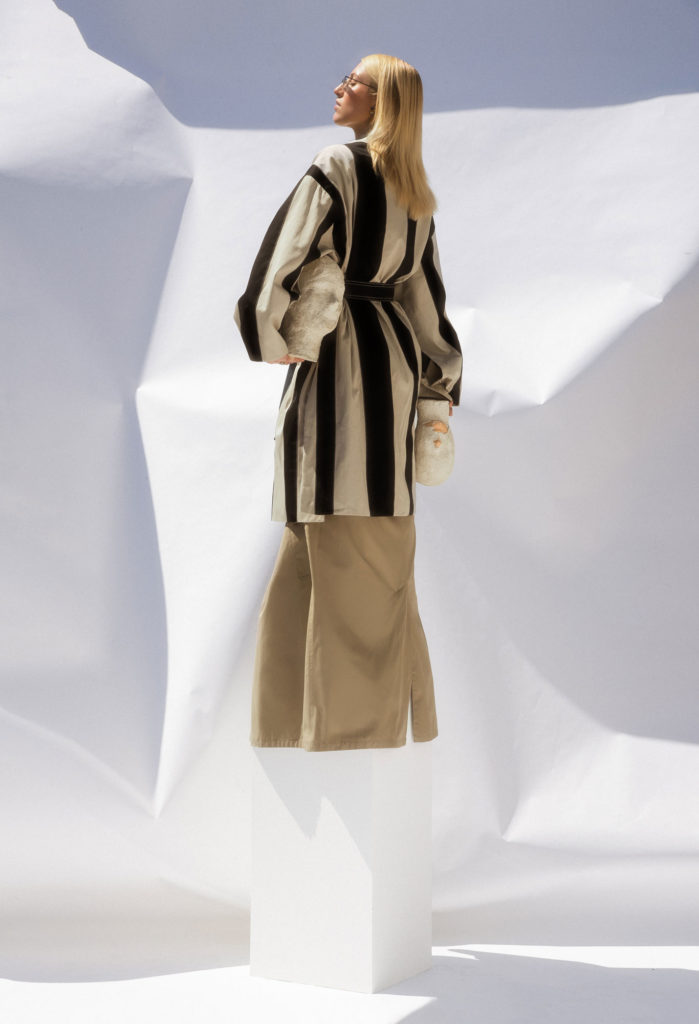
jacket HYUN MI NIELSEN
Sunglasses A BETTER FEELING
shoes COS